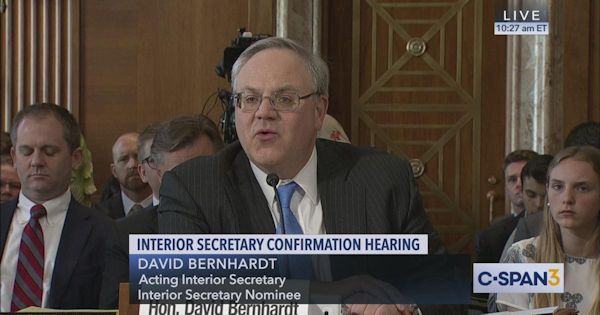SEJournal Online is the digital news magazine of the Society of Environmental Journalists. Learn more about SEJournal Online, including submission, subscription and advertising information.
 |
| Interior Secretary David Bernhardt at Senate confirmation hearings on March 28. Bernhardt was later confirmed despite the failure to release documentation that showed meetings with lobbying groups while in his previous capacity at Interior. Image: C-Span. Click to enlarge. |
WatchDog: Protecting Journalists from Attack, Info Row at Interior, PIO Standards and More
1. Lawmakers Reintroduce Journalist Protection Act
2. Science Writers Hammer Out Standards for Information Access Via PIOs
3. Row Over Bernhardt Calendar Disclosure Doesn’t Stop Senate Confirmation
4. Are You Getting a “404” Error on That Government Web Page? Track It!
1. Lawmakers Reintroduce Journalist Protection Act
Three Democrats have reintroduced a bill making it a federal crime to attack those reporting the news. The prohibited acts include physical assault causing injury and assault with intent to intimidate.
Sponsors of the bill (H.R. 1684), introduced March 12, are Rep. Eric Swalwell of California, Sen. Richard Blumenthal of Connecticut and Sen. Bob Menendez of New Jersey.
Swalwell said the bill was necessary because President Donald Trump has “blatantly stoked a climate of extreme hostility toward the press.”
The bill currently has 13 other co-sponsors. It has been referred to the House Judiciary Committee, which has not yet taken any action on it.
2. Science Writers Hammer Out Standards for Information Access Via PIOs
You may have heard the Society of Environmental Journalists complaining on behalf of its members that various environmental agency press offices are obstructing access to sources and information that reporters need. Here’s an example.
Now the National Association of Science Writers, or NASW, has come up with some “information access standards” that may help benchmark for both journalists and public information officers how the game should — we emphasize should — be played.
The standards were hammered out at a workshop Oct. 16-17, 2018, after the NASW’s annual meeting. Representatives from a range of journalism groups (including SEJ’s WatchDog editor Joseph A. Davis) participated in that workshop.
NASW is unusual among J-groups in that its membership includes both journalists and public information officers, or PIOs. The PIOs represented in NASW are from science agencies — which tend to be considerably more open than regulatory agencies like the U.S. Environmental Protection Agency.
The standards, which have been approved by the NASW board, can be found here.
‘Science is a powerful mechanism
for pursuing truth and producing knowledge.
The public is entitled to scientific information.’
— National Association of Science Writers
The bottom line: ”Science is a powerful mechanism for pursuing truth and producing knowledge. The public is entitled to scientific information.”
And also, “Scientific information is valuable to the extent that it is conveyed accurately, with appropriate context, and without hype, exaggeration, slant, or omission.”
The key principles: truth, accuracy, transparency, accountability, openness, respect and public service.
3. Row Over Bernhardt Calendar Disclosure Doesn’t Stop Senate Confirmation
Conflict over disclosure of his meetings with energy groups did not stop the Senate from confirming David Bernhardt (may require subscription) as Interior Secretary by a 56-41 vote on April 11.
At issue was disclosure of Bernhardt’s calendars — his real calendars. House committees, journalists and environmental groups had been trying to get hold of the calendars as a way of revealing any meetings Bernhardt held (while deputy or acting secretary) with lobby groups whose interests Interior acts upon, in industries like fossil fuels, timber, water and mining.
Bernhard had first said he did not personally keep calendars. Then he released calendars indicating only “external meeting.” Finally, following Congressional demands and private Freedom of Information Act requests, he grudgingly acknowledged that the names of the groups he had met with were left off the calendars.
Thousands of pages (may require subscription) went to the House Natural Resources Committee, which oversees Interior. And those groups he met with are only now coming to light.
Democrats asked Interior’s inspector general for an investigation into potential conflicts of interest — and the opening of one was announced just a few days after Bernhardt took office.
4. Are You Getting a “404” Error on That Government Web Page? Track It!
A new tracking database will soon allow you to follow all the critical information the Trump administration is removing from the web.
Environmental journalists have gotten used to seeing pages on things like climate change disappear from websites of the EPA and other agencies. Geeks know that a “404 Error” is the message you get when you try to browse a web page that isn’t there.
Groups like EDGI (Environmental Data and Governance Initiative) have devoted hundreds of volunteer hours to cataloging the pages before they disappear.
Now the Sunlight Foundation has launched a new tracking database, known as Gov404, via its Web Integrity Project, to find and follow pages disappeared into the memory hole. They welcome collaboration with journalists.
* From the weekly news magazine SEJournal Online, Vol. 4, No. 17. Content from each new issue of SEJournal Online is available to the public via the SEJournal Online main page. Subscribe to the e-newsletter here. And see past issues of the SEJournal archived here.













 Advertisement
Advertisement 



